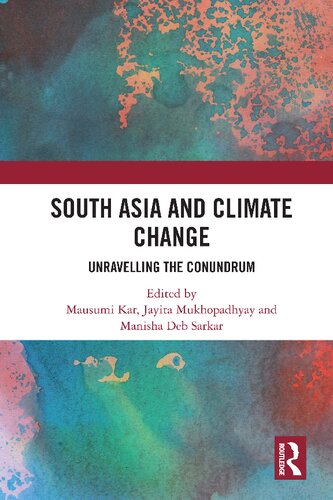

Most ebook files are in PDF format, so you can easily read them using various software such as Foxit Reader or directly on the Google Chrome browser.
Some ebook files are released by publishers in other formats such as .awz, .mobi, .epub, .fb2, etc. You may need to install specific software to read these formats on mobile/PC, such as Calibre.
Please read the tutorial at this link: https://ebookbell.com/faq
We offer FREE conversion to the popular formats you request; however, this may take some time. Therefore, right after payment, please email us, and we will try to provide the service as quickly as possible.
For some exceptional file formats or broken links (if any), please refrain from opening any disputes. Instead, email us first, and we will try to assist within a maximum of 6 hours.
EbookBell Team

4.7
86 reviewsThis book provides a comprehensive and interdisciplinary examination of the diverse aspects of climate change in South Asia. The region, home to almost 4% of the world’s population, is under serious threat from climatic disasters. The volume underscores the urgency of addressing cataclysmic events related to climate change and their ramifications on the economy, agriculture and livelihoods of the region. The book discusses the reasons causing climate change as well as highlights normative and ethical considerations involved in the battle against climate change.
With case studies from India, Sri Lanka and Bangladesh, it explores issues such as extreme climatic events; energy use, fossil fuels, non-renewable resources and carbon dioxide emission in South Asia; internal migration and climate refugees; the ethical dilemma of sustainable development; technological advancements for extreme weather forecast; and responses to climate change in South Asia. Highlighting the need for striking a balance between developmental imperatives and environmental sustainability, the chapters also show the North-South divide in the research agenda and policies on climate change and the global politics that underlie climate policies. The volume juxtaposes a scientific analysis of factors responsible for climate change with an analysis of the human cost of climate change from the perspective of social sciences. It discusses the challenges faced by developing countries while also offering recommendations and solutions.
This book will be of interest to scholars and researchers of climate studies, geography, public policy and governance, sustainable development, development studies, environmental studies, political studies, international relations, political economy, economics and sociology. It will also be useful to practitioners, thinktanks, policymakers and civil society organisations working on environmental management.